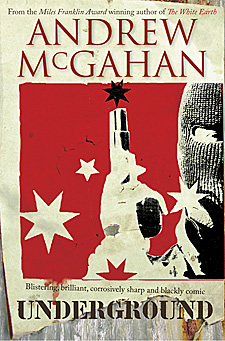It is 2011 and Australia has been transformed by the war on terror. Canberra has been wiped out by a nuclear terrorist attack, and the Prime Minister has assumed dictatorial powers. Security checkpoints cover the country, and summary executions are common place. There are identity cards and citizenship tests, and all muslims have been forced into walled ghettos.
This is the future imagined by Andrew McGahan in his new book, Underground. The story revolves around Leo James, an immoral property developer who also happens to be the Prime Minister’s brother. Leo finds himself a prisoner of the Oz Underground, a secret organisation dedicated to overthrowing the government. In the company of a blue-eyed Islamic terrorist named Aiesha, Leo is chased across the country by the authorities. He finally confronts his brother, and uncovers the dark secret at the heart of the new Australia.
McGahan describes the book as “both an adrenalin-pumped thriller and a gleefully barbed satire”. As a thriller, the book succeeds. Chapter one commences in the midst of a hurricane, and the pace does not let up from there. The book is filled with gun fights, car chases, plane crashes, bombs and explosions. With each page we learn more about the mysterious Oz Underground, and draw closer to finding out why half the country is chasing Leo. Underground is a page turner " McGahan seems to have a firm grasp of the thriller genre.
On the accompanying website, McGahan is upfront about his political motivation. He says, "Underground was written very much out of disgust with the Howard government, and out of anger about the direction in which Australia is being taken…". He chose to express himself in a novel because "there's nothing more dull than a stream of invective…so I knew that I couldn't just write "I hate John Howard' fifty thousand times over."
 And so the thriller is also a political satire, and on this front it is less successful. McGahan's vision of Australia is pretty unimaginative " all he has really done is transplant a few elements from Nazi Germany. The message, more or less, is "John Howard is a fascist'. I did not gain any particular insights into contemporary society " all I really learnt was that the author dislikes neo-conservatism.
And so the thriller is also a political satire, and on this front it is less successful. McGahan's vision of Australia is pretty unimaginative " all he has really done is transplant a few elements from Nazi Germany. The message, more or less, is "John Howard is a fascist'. I did not gain any particular insights into contemporary society " all I really learnt was that the author dislikes neo-conservatism.
But even if the book fails as satire, it is a failure redeemed by the boldness of the concept. A well-written genre novel can be a fine vehicle for serious political discussion. This led me to reflect upon the novels written by Christian authors. They are generally either completely secular, or they are written exclusively for a Christian market. There is very little in between.
The success of The Da Vinci Code shows that the reading public is quite happy to engage with "big ideas' in the pages of a good fiction. McGahan includes large chunks of political discussion in his book without detracting from an entertaining story. I hope an enterprising Christian writer will be encouraged to attempt something similar.






















